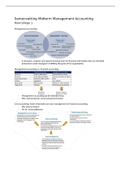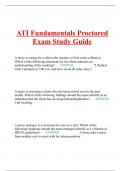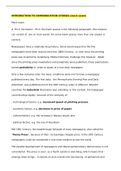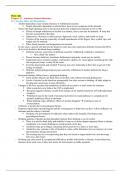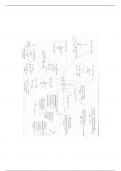Transnational Politics Lecture Notes
Lecture 1 (07/09/2022): Power and legitimacy in global politics
Transnational: the career of a concept
- Transnational America: early 20th century; cosmopolitan and inclusive for immigrants
- After WWII: growing concern for minorities (as victims of state-centred approach)
- Political economy: transnational corporations
- End of Cold War -> growing attention for transnational in social sciences -> global
governance
- Core debate: state-centred vs (global) society dominated (and interest for minorities) -
> power
Transnational politics
- Transnational
o (Nye and Keohane reading)
- Transnational politics
o May be understood as politics that transcend the confines of the formal
political institutions that have crystallised in the (19th and) 20th century
Main questions by Nye and Keohane
- Loss of control national states?
- Is state-centric approach in political science still valid?
- What are the effects of transnational relations?
- Who benefits from transnational relations, who loses?
- Role of (non-gov) transnational organisation in global gov issues?
Network polity (Bevir)
- Power is diffuse
- Government (nation-state) is just one public body involved in policy making (others
are also relevant and we need to study them)
- Government rarely controls and dictates policy – it attempts to steer ang regulate
policy networks via laws, money, and negotiation
- But main question is: policy specialisation (new form of governance) or new theory of
governance?
Rethinking global governance
- Differentiated polity: governance occurs in and through transnational networks. But
how? And what happens if governance mechanisms fail?
- The policy, authority, and resources necessary for tackling global problems remain
vested in individual states rather the collectively in universal institutions, but the
problems not -> collective action problem and free-riders
Rival hypotheses
- 1a) engagement in transnational politics empowers marginalised groups
- 1b) engagement in transnational politics reinforces the power of predominant
(nationalistic) political actors in decision-making
- 2a) transnational politics decreases the control of nation-states over their populations
- 2b) transnational politics increases the control of nation-states over their populations
1
, - 3a) transnational political issues are best governed by state institutions: the nation
state is still the supreme source of authority from which other institutions derive their
power
- 3b) transnational political issues are best governed through transnational
arrangements
Legitimacy
- Empirical: when studying legitimacy you study the reasons why people actually put
up with systematic use of power
o Classical origin comes from Max Weber
o Legitimacy just is the belief in legitimacy; but this tells us nothing about
whether we have reason to believe in legitimacy or what reasons we have to
comply
Intrinsically and extrinsically evaluative concepts
- Intrinsically evaluative concepts cannot be used without expressing a value judgement
about its object
o If you can use it in a concept that does not imply any value judgement it is not
intrinsically evaluative
o E.g. justice
- Extrinsically evaluative concepts can be used in ways that are evaluative or not
o E.g. equality
- Legitimacy
o Normatively intrinsic, but empirical researchers may argue that it is extrinsic
(statement of expectations of things that may or may not happen)
o Divergence explains a lot about different subfields of political science
Hurrell and Macdonald
- About what should be the type of power that we look to regulate when we aim at
crafting some normative principles of legitimacy for the global order
- It is not empirically obvious anymore that the only important place that power is
exercised is the sovereign state
- Authors propose that before we launch into producing a new theory of political
legitimacy, we need to agree what has replaced the unified sovereign state as the
subject of the traditional theories of legitimacy
- Identify 3 families of answers to the question
o States (Westphalian)
▪ If we didn’t have massive problems with the Westphalian picture, we
wouldn’t be having this conversation in the first place
o Basic structure (Rawlsian)
▪ Global basic structure is/should be the subject of global principles of
legitimacy -> system of social cooperation (or at least we should strive
for this) and structure to solve conflicts that we may run into
▪ We know that such structures have expanded well beyond states and in
that case we need principles to regulate this
▪ Not clear that the kind of story that tells us when questions of
distributive justice arise can tell us anything about legitimacy
o Global governance
2
, ▪ Different kinds of power exercised all over the place, they all can be
made to contribute to a single vision of what should be the question of
global exercise of power
▪ Too optimistic -> presupposes cooperative attitudes, consensus on the
aims of the use of power that is not to be found in this pluralistic
myriad of institutions
- Authors propose new subject: global public power (defined in reading)
- Rossi’s take
o Empty box in sense that it leaves a lot to be filled in empirically
o Does not have much value until we fill in that box with empirics
o First two conditions are empty boxes, third condition tells us what we should
use to fill in those boxes
o Disagreements
▪ 1) they keep talking about the exercise of power, but it seems that
leaves something important out of the picture: you can have power
without exercising it. Trade-off in looking for the observable stuff
where you end up neglecting the less obvious power that is not
exercised
▪ 2) if you are looking for these general principles, you still haven’t
completely shed that statist heritage that we are looking to get rid of by
moving away from a state-centric views -> why are we looking for this
subject? Even posing the question of what a uniform framework should
be presupposes that model that power is only in one place and
hierarchically organised, which replicates the sovereigntist scheme
3
Lecture 1 (07/09/2022): Power and legitimacy in global politics
Transnational: the career of a concept
- Transnational America: early 20th century; cosmopolitan and inclusive for immigrants
- After WWII: growing concern for minorities (as victims of state-centred approach)
- Political economy: transnational corporations
- End of Cold War -> growing attention for transnational in social sciences -> global
governance
- Core debate: state-centred vs (global) society dominated (and interest for minorities) -
> power
Transnational politics
- Transnational
o (Nye and Keohane reading)
- Transnational politics
o May be understood as politics that transcend the confines of the formal
political institutions that have crystallised in the (19th and) 20th century
Main questions by Nye and Keohane
- Loss of control national states?
- Is state-centric approach in political science still valid?
- What are the effects of transnational relations?
- Who benefits from transnational relations, who loses?
- Role of (non-gov) transnational organisation in global gov issues?
Network polity (Bevir)
- Power is diffuse
- Government (nation-state) is just one public body involved in policy making (others
are also relevant and we need to study them)
- Government rarely controls and dictates policy – it attempts to steer ang regulate
policy networks via laws, money, and negotiation
- But main question is: policy specialisation (new form of governance) or new theory of
governance?
Rethinking global governance
- Differentiated polity: governance occurs in and through transnational networks. But
how? And what happens if governance mechanisms fail?
- The policy, authority, and resources necessary for tackling global problems remain
vested in individual states rather the collectively in universal institutions, but the
problems not -> collective action problem and free-riders
Rival hypotheses
- 1a) engagement in transnational politics empowers marginalised groups
- 1b) engagement in transnational politics reinforces the power of predominant
(nationalistic) political actors in decision-making
- 2a) transnational politics decreases the control of nation-states over their populations
- 2b) transnational politics increases the control of nation-states over their populations
1
, - 3a) transnational political issues are best governed by state institutions: the nation
state is still the supreme source of authority from which other institutions derive their
power
- 3b) transnational political issues are best governed through transnational
arrangements
Legitimacy
- Empirical: when studying legitimacy you study the reasons why people actually put
up with systematic use of power
o Classical origin comes from Max Weber
o Legitimacy just is the belief in legitimacy; but this tells us nothing about
whether we have reason to believe in legitimacy or what reasons we have to
comply
Intrinsically and extrinsically evaluative concepts
- Intrinsically evaluative concepts cannot be used without expressing a value judgement
about its object
o If you can use it in a concept that does not imply any value judgement it is not
intrinsically evaluative
o E.g. justice
- Extrinsically evaluative concepts can be used in ways that are evaluative or not
o E.g. equality
- Legitimacy
o Normatively intrinsic, but empirical researchers may argue that it is extrinsic
(statement of expectations of things that may or may not happen)
o Divergence explains a lot about different subfields of political science
Hurrell and Macdonald
- About what should be the type of power that we look to regulate when we aim at
crafting some normative principles of legitimacy for the global order
- It is not empirically obvious anymore that the only important place that power is
exercised is the sovereign state
- Authors propose that before we launch into producing a new theory of political
legitimacy, we need to agree what has replaced the unified sovereign state as the
subject of the traditional theories of legitimacy
- Identify 3 families of answers to the question
o States (Westphalian)
▪ If we didn’t have massive problems with the Westphalian picture, we
wouldn’t be having this conversation in the first place
o Basic structure (Rawlsian)
▪ Global basic structure is/should be the subject of global principles of
legitimacy -> system of social cooperation (or at least we should strive
for this) and structure to solve conflicts that we may run into
▪ We know that such structures have expanded well beyond states and in
that case we need principles to regulate this
▪ Not clear that the kind of story that tells us when questions of
distributive justice arise can tell us anything about legitimacy
o Global governance
2
, ▪ Different kinds of power exercised all over the place, they all can be
made to contribute to a single vision of what should be the question of
global exercise of power
▪ Too optimistic -> presupposes cooperative attitudes, consensus on the
aims of the use of power that is not to be found in this pluralistic
myriad of institutions
- Authors propose new subject: global public power (defined in reading)
- Rossi’s take
o Empty box in sense that it leaves a lot to be filled in empirically
o Does not have much value until we fill in that box with empirics
o First two conditions are empty boxes, third condition tells us what we should
use to fill in those boxes
o Disagreements
▪ 1) they keep talking about the exercise of power, but it seems that
leaves something important out of the picture: you can have power
without exercising it. Trade-off in looking for the observable stuff
where you end up neglecting the less obvious power that is not
exercised
▪ 2) if you are looking for these general principles, you still haven’t
completely shed that statist heritage that we are looking to get rid of by
moving away from a state-centric views -> why are we looking for this
subject? Even posing the question of what a uniform framework should
be presupposes that model that power is only in one place and
hierarchically organised, which replicates the sovereigntist scheme
3

